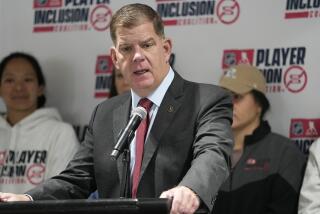ANALYSIS : NHL Negotiators Get Together, but Not on Issues
- Share via
Negotiators for the NHL and its players’ association met six times in 10 days before breaking Saturday, after union officials requested time to plan strategy.
Is it encouraging that they’re talking so much, or are they merely running in place? Are players stalling, expecting owners to cave in around Christmas, or have they gone as far as they intend to go, as some sources say?
NHL executives left Saturday’s meeting in Boston wearing grim expressions. Talks might resume there this week.
“There was a sense of anticipation on our side that we’d have two big days here. The fact that we didn’t get anything done at all leaves you a little frustrated,” Bruin General Manager Harry Sinden said.
Said Toronto General Manager Cliff Fletcher: “I don’t know whose court the ball is in, but whoever has it, they’d better start playing with it.”
Here’s where they stand on the pivotal issues. All agreements are in principle and are subject to revision.
ENTRY-LEVEL SALARIES AND RIGHTS
The union was soft on rookie salaries from the start, and it’s no surprise it agreed to a cap that will limit salaries to be paid over players’ first three seasons. However, the limit will be the subject of heated discussion. The union wants rookies to average $1.5 million per season, but the league is looking at about $750,000 per season.
They agreed to institute two-way contracts that include a minor league pay scale. They’ve also agreed that players won’t be eligible for salary arbitration or free agency during their first three seasons. No great losses for players here, but no huge gains for owners, either.
FREE AGENCY
Compensation for players in Group 2--more than three years’ NHL experience but under age 28--will be reduced from five first-round picks, probably to three picks. The union will insist on that, having given in on allowing clubs to retain the right to match offers made to their free agents. Players will get the easier free agency they sought, because three picks inhibit, but don’t prohibit, signings.
As proposed by the NHL, players in Group 3--who are at least 28 and have either eight years’ NHL service or 10 years’ pro experience--would be granted unrestricted free agency. The exception would be one designated “franchise player” per club. Clubs would retain the right to match offers made to those players. The NHLPA is fighting this, believing it would severely restrict the movement of elite players. It has no strong objections to the age or service terms.
SALARY ARBITRATION
The league wants only Group 2 players to be eligible and it wants arbitration to be non-binding on the club. In hearings, players would be able to compare themselves only to other Group 2 players. The club might also be allowed to release players if it disagrees with the decision.
The NHLPA doesn’t like non-binding arbitration and would agree only if players are granted free agency if their clubs reject the arbitrator’s decision.
TAX CONCEPT
This is hovering over the talks like a vulture, waiting to kill a deal.
A number of owners are willing to discard the proposed payroll tax, which would be assessed against clubs who exceed a predetermined limit, but they do want a mechanism to slow salary growth. The league has brought up a tax on rookie signings that exceed a certain level and on free-agent signings. Also possible is a payroll tax that adjusts according to the previous season’s rate of revenue and salary growth. The NHL is still willing to impose a tax on gate receipts, with proceeds going to small-market clubs.
Players oppose a payroll tax, claiming it functions as a salary cap. Remember, though, they vowed early on not to accept a rookie cap. Sources say players, if threatened with no season, would accept a payroll tax that peaks at 30% if it’s coupled with a gate tax. That would signify to players that owners are willing to share the tax burden.
ENTRY DRAFT
They agree on an eight-round draft of 20-year-old players, with provisions for 18- and 19-year-olds to enter. However, the NHL wants clubs to retain rights to drafted players for three years. The union wants to maintain the current two-year rule.
MISCELLANEOUS
Commissioner Gary Bettman, who wants to guarantee prospective expansion owners they will have long-term labor peace, wants a six- or seven-year deal. Players don’t want to commit themselves for more than three or four years to new restrictions that might pinch their wallets dramatically. They also see a boom period coming and want to get their share. Bettman got his way (a four-year pact) in last year’s strike by on-ice officials, and a similar term might work here.
Players have discussed cutting the first round or two of the playoffs to best of five, but owners are unlikely to go along because they make most of their profits on playoff tickets.
If they can’t get owners to pay their full salaries for the season--owners will never go for that--players will ask to be paid from the day they report to camp, not from the day the season starts. They will probably win that point.
More to Read
Go beyond the scoreboard
Get the latest on L.A.'s teams in the daily Sports Report newsletter.
You may occasionally receive promotional content from the Los Angeles Times.







